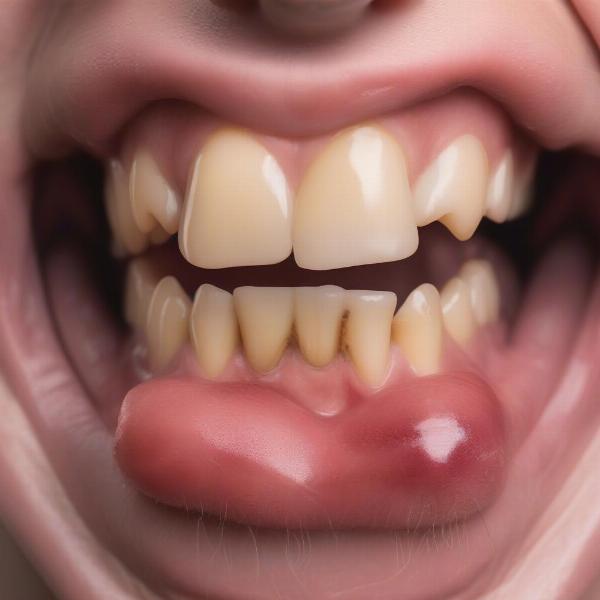Keeping your dog’s teeth clean is crucial for their overall health and well-being. A dog teeth cleaner, whether a toothbrush, specialized tool, or even a dental treat, plays a vital role in preventing dental disease and ensuring a happy, healthy pup. This article explores various dog teeth cleaner options, alongside tips and techniques for effective canine dental hygiene.
Choosing the Right Dog Teeth Cleaner for Your Canine Companion
Selecting a suitable dog teeth cleaner can feel overwhelming with so many options available. From traditional toothbrushes and enzymatic toothpaste to innovative ultrasonic cleaners and dental chews, the choices are diverse. Consider your dog’s size, breed, temperament, and existing dental health when making your decision. For puppies and smaller dogs, a finger brush might offer better control and gentleness, while larger breeds might benefit from a longer-handled toothbrush. ultrasonic teeth cleaner for dogs are gaining popularity for their effectiveness in removing plaque and tartar buildup.
Different Types of Dog Teeth Cleaners
Several types of dog teeth cleaners cater to different needs and preferences:
- Toothbrushes: Designed specifically for canine teeth, these come in various sizes and bristle types.
- Finger Brushes: Ideal for puppies and smaller dogs, these slip onto your finger for precise cleaning.
- Dental Chews and Treats: These offer a more palatable approach to dental care, promoting chewing action that helps scrape away plaque.
- Dental Sprays and Gels: These can help freshen breath and reduce bacteria in the mouth.
- Ultrasonic Teeth Cleaners: These innovative tools use vibrations to dislodge plaque and tartar.
Establishing a Dental Care Routine for Your Dog
Just like humans, dogs need regular dental care to prevent plaque buildup and gum disease. Ideally, you should aim to brush your dog’s teeth daily. If this isn’t feasible, aim for at least a few times a week. Start slowly, introducing the dog teeth cleaner gradually and rewarding your dog with praise and treats. Use enzymatic toothpaste formulated for dogs, never human toothpaste, which can be toxic to them.
Tips for Effective Teeth Cleaning
- Introduce the dog teeth cleaner slowly and positively.
- Use dog-specific toothpaste.
- Focus on the outer surfaces of the teeth where plaque accumulates.
- Be gentle and patient.
- Reward your dog with praise and treats.
Recognizing Signs of Dental Problems in Dogs
 Dog Dental Problems: Close-up of a dog's mouth showing signs of gum inflammation and tartar buildup.
Dog Dental Problems: Close-up of a dog's mouth showing signs of gum inflammation and tartar buildup.
Being aware of potential dental problems is crucial for early intervention. Watch for signs such as bad breath, red or swollen gums, difficulty eating, excessive drooling, and loose teeth. If you notice any of these signs, consult your veterinarian. Early detection and treatment can prevent more serious dental issues down the line.
Maintaining Your Dog’s Oral Health: Beyond Brushing
Regular brushing with a dog teeth cleaner is essential, but other strategies can further enhance your dog’s oral hygiene. Dental chews and treats, dog tartar remover, and dog dental powder can help reduce plaque and tartar buildup. Providing your dog with chew toys designed to promote dental health can also be beneficial.
“Regular dental care, including the use of a good quality dog teeth cleaner, can significantly improve a dog’s quality of life,” says Dr. Emily Carter, DVM, a leading veterinary dentist. “It’s a simple yet crucial step in preventing painful dental disease and promoting overall well-being.”
Conclusion
Maintaining your dog’s oral health is a crucial aspect of responsible pet ownership. Choosing the right dog teeth cleaner and establishing a consistent dental care routine can help prevent dental disease, ensuring a happy and healthy life for your furry friend. Remember to consult your veterinarian for personalized advice and guidance on the best dental care practices for your dog. dental dog wipes can be a useful addition to your dog’s dental care routine, especially for quick cleanings between brushings.
FAQ
- How often should I clean my dog’s teeth? Ideally, daily. If not possible, aim for at least a few times per week.
- What type of toothpaste should I use for my dog? Always use enzymatic toothpaste formulated for dogs, never human toothpaste.
- Can I use a human toothbrush on my dog? It’s best to use a toothbrush designed specifically for dogs.
- What are the signs of dental problems in dogs? Bad breath, red or swollen gums, difficulty eating, excessive drooling, and loose teeth.
- What should I do if I notice signs of dental problems in my dog? Consult your veterinarian immediately.
ILM Dog is a leading online resource for dog owners worldwide, providing expert advice on all aspects of dog care, from breed selection and training to health, nutrition, and grooming. We are committed to promoting responsible pet ownership and helping dog owners provide the best possible care for their canine companions. We offer expert advice on various topics, including the best dog dental wipes for maintaining your dog’s oral hygiene. For further information, contact us via email at [email protected] or phone at +44 20-3965-8624. ILM Dog is dedicated to helping you provide the best care for your furry friend.